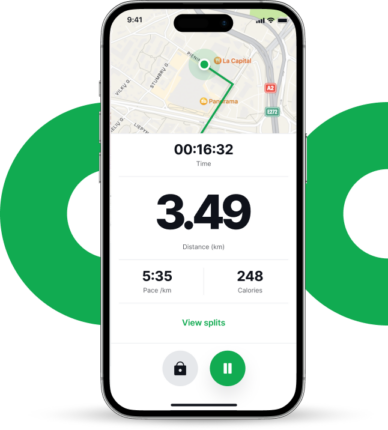Need a performance boost before your running workouts? Taking a pre-workout supplement for running could boost your energy, speed, and endurance. It could help you reach your running goals faster and get more out of every run.
But before you take one, it’s important to know what’s in it and how to use it. In this post, we’ll cover all the essentials about pre-workout for running supplements. And we’ll help you discover the best pre-workout for you.
So, ready for a performance boost?
In This Article:
What Is Pre-Workout for Running Supplement?
A pre-workout for running is a dietary supplement featuring multiple ingredients. It’s specially formulated to increase your energy and athletic performance while running. It does this by stimulating your nervous system and improving blood flow to your muscles.
Taking a pre-workout supplement before running is nothing new. People have long drunk coffee before running or heading to the gym to take advantage of the caffeine high.
Pre-workout supplements often have caffeine, an established performance booster for athletes. Those specially made for runners often feature additional ingredients that promote endurance, hydration, and electrolyte replacement.
Pre-workout supplements come in many shapes and sizes, including drink mix powder or pills.
Benefits of Pre-Workout Supplements
So, are pre-workout supplements good for running? When they contain scientifically proven ingredients, they can have real benefits.
Being inactive and/or overweight or having type 2 diabetes often leads to fewer type 1 muscle fibers. These are the muscle fibers you need for endurance running. If you want to run but find it difficult, a pre-workout supplement can give your muscles the energy boost you need to get started.
It may also improve your glycogen metabolism. Your body stores glucose from food as glycogen and breaks it down to fuel your runs. Alongside a diet rich in healthy carbs, a pre-workout for running supplement may help support glycogen metabolism. It does this by providing the right micronutrients for your body to build up and use glycogen stores effectively. At the same time, it may accelerate fat burning and calorie shedding.
The caffeine in a pre-workout supplement boosts your endurance and increases focus. If the pre-workout also has electrolytes, it can improve hydration and endurance.
What about muscle building? Are pre-workout supplements good for that too? Branched-chain amino acids (BCAAs) supplements alone may not be enough to help you build muscle effectively. In other words, taking a BCAA body-building supplement is not likely to make you a stronger runner. If you take BCAAs, you need to incorporate them with other amino acids and nutrients.
When Should You Take Pre-Workout Supplements?
The effects of pre-workout supplements often need 30 minutes or more to kick in. So, it’s best to take them before you run or do a demanding workout.
It’s important to remember that a pre-workout supplement for runners isn’t a substitute for a healthy diet. Knowing what to eat before or after a workout can ensure that you get the most out of your supplements and speed up muscle recovery.
Before workouts, stick to foods that are not likely to upset your stomach. Think oats, whole grains, protein shakes, boiled eggs, and fresh fruit.
Your body needs protein and carbs to recover and build muscle after exercise. Don’t forget about healthy fats and essential nutrients either. After your workout, you can eat a meal rich in healthy carbs and lean protein. Legumes, fish, gluten-free whole grains, and plenty of veggies and fruits are smart choices. The plate method can help keep your meals balanced and healthy.
Important: Know what’s in your pre-workout for running supplement. It will then be easier to figure out what to eat before doing cardio. For example, if it has caffeine, it may not be a good idea to drink coffee before your workout.
What Are Pre-Workout Supplements Made From?
Pre-workouts for running focus on ingredients that boost endurance and athletic performance. Here are some of the key ingredients you can expect to find in them.
BCAAs
Branched-chain amino acids (BCAAs) refer to three of the nine essential amino acids that your body must get through diet. They are valine, leucine, and isoleucine. BCAAs play a key role in muscle building, may reduce muscle soreness and fatigue, and prevent muscle wasting.
Caffeine
Caffeine can improve muscular function during different types of workouts. This ranges from increasing isokinetic strength during machine exercises to boosting endurance and aerobic performance.
Caffeine may also help boost metabolism and accelerate fat loss. In addition to its performance and metabolic benefits, caffeine can also improve mood and alertness.
Taking in caffeine may also be effective when you need to do your workouts but don’t feel like it. For example, after a night of bad sleep. A 2012 study concluded that caffeine can increase athletes’ workout capacity even if they are sleep-deprived.
Creatine
Creatine is another important amino acid for the body. Most of it is stored in your skeletal muscles and provides a steady energy supply when you run. It can create an energy burst and boost your strength too.
Creatine enhances the production of adenosine triphosphate (ATP), the basic energy form in your cells. Taking creatine has proven benefits when it comes to increasing high-intensity exercise capacity.
Creatine supplementation can benefit especially young athletes who need to mobilize reserves of high energy.
Beta-alanine
Beta-alanine is another amino acid that has proven benefits for athletes when taken in supplement form. Your body uses it alongside histidine to produce carnosine.
Carnosine reduces the accumulation of lactic acid in your muscles during exercise. Taking beta-alanine may increase your exercise capacity during high-intensity exercise and attenuate fatigue.
Betaine
Beets, cereals, and spinach are rich in betaine, a compound that plays an important role in cellular reproduction and liver function. Animal studies have suggested that betaine supplementation may reduce body fat and promote lean muscle gain.
Are Pre-Workout Supplements Approved by FDA?
Like other supplements, these are not regulated by the Food and Drug Administration. Since no regulatory body checks the efficiency of their formulas, you want to do your own research. Pay attention to the list of ingredients and know what you’re taking in.
Are There Any Side Effects?
Since pre-workout for running supplements almost always contain caffeine, you want to watch your doses. WebMD notes that caffeine can cause digestion problems, anxiousness, restlessness, jitters, increased heart rate, insomnia, and other side effects. A large dose of caffeine can give you a headache and chest pain.
Good to know: A dose of up to 400mg of caffeine per day is safe for healthy adults.
So, is a pre-workout supplement bad for you in any way? If you’re sensitive to caffeine or take it on top of other foods or drinks with caffeine, it may give you the jitters. It also depends on what else it contains and whether you have any allergies to those ingredients.
The bottom line is that it is safe if you pay attention to what it contains and don’t overdose on it.
Should You Use Pre-Workout Supplements Before Every Run?
Your body adapts to caffeine supplementation, developing a progressive tolerance to its benefits. In other words, it may not be a good idea to take a pre-workout supplement before each workout. If you do, you may not benefit from it as much as you would if you took it less frequently.
When should you take it then? Consider the different types of running and workouts you do. Take it before the more demanding training sessions. For example, you can take it during high-intensity interval training or running speed workouts. Or when you perform exercises to improve running speed.
You can, of course, also take it before a long run or on race day. Or on that day of the week when you don’t feel like getting out of bed but need to run to complete your weekly training plan.
Is Pre-Workout Supplementation Safe for Running?
Pre-workout supplements formulated for runners are safe if you choose a quality product and stick to the recommended dose.
Also important is to avoid overdosing on caffeine or any other ingredients. Be careful when taking additional supplements or drinking energy drinks.
To minimize side effects, choose an all-natural pre-workout for running supplement and start with a small dose. Notice its effects on your body. If needed, adjust the dose.
How Long Does a Pre-Workout Supplement Last?
A pre-workout supplement kicks in within half an hour and gives you an energy boost for up to six hours. The effects of some supplements last only for three hours or so. Even so, that’s usually more than enough for you to get more out of a long run.
The duration of the effect will likely depend on the dose, caffeine tolerance, diet, and other factors. Again, it’s important to observe how your body reacts to it.
Takeaway
Now let’s sum up the main points we’ve discussed here:
- Pre-workout for running supplements can boost your endurance and have other notable benefits. But you have to pay attention to what they contain.
- Caffeine is a key ingredient in many pre-workout formulas, and science backs it up. Other ingredients you may find in it include BCAAs, creatine, beta-alanine, and electrolytes.
- You want to be careful not to overdose on pre-workout supplements or take them too often.
- While not regulated by the FDA, pre-workout for running supplements can be safe if you read the labels and stick to the recommended doses.
In the end, pre-workout supplements can give you an energy boost when you most need it. To reduce risks and maximize benefits, choose one that’s safe and uses scientifically proven ingredients.














